The following is a transcription of the Special HSV BOD Meeting on 5/23/19 at 1 p.m. This is being provided as a service for our hearing-impaired neighbors.
In attendance were six board members, with Mike Medica absent due to serious illness.
The board members in attendance were Cindi Erickson, Chairperson, Tormey Campagna, Vice Chair, Diana Podawiltz, Dick Garrison, Buddy Dixon and Nancy Luehring. Also, in attendance from the POA were Lesley Nalley, CEO, Liz Mathis, CFO and Ella Scotty, Executive Assistant.
This transcript was transcribed to the best of my ability. To my knowledge, it is very close to what was said in the May 23, 2019 Board of Directors meeting.
Erickson: “I’d like to call this meeting to order.”

Audience continues chatter
Erickson: “I’d like to call the meeting to order. It’s one o’clock and I call this meeting to order. Our Parliamentarian has declared that we do have a quorum. However, we do have an excused medical absence in Director Medica today. At this point, I call on Director Dixon to lead us in prayer, followed by Director Garrison to lead us in the pledge of allegiance.”
Dixon: “LORD, thank you for our Village. We all have so much to be thankful for. And sometimes we forget to say ‘thank you’. Lord, today we pray to be open to other’s ideas and beliefs, respectful of our differences, not threatened by them. May we grow in understanding of our own motives, knowing that people often act out of their own fears. Lord may we be a force for replacing fear with insight, helping us all to be patient and kind as we talk. Strength, real strength can always find compromise. Working together, Lord, may we find a common ground. Enable us to move forward with a shared purpose. Lord, may we see what is truly important and let it unite us, as we find strength in our diversity and seek the courage to move forward for the future of our Village.”
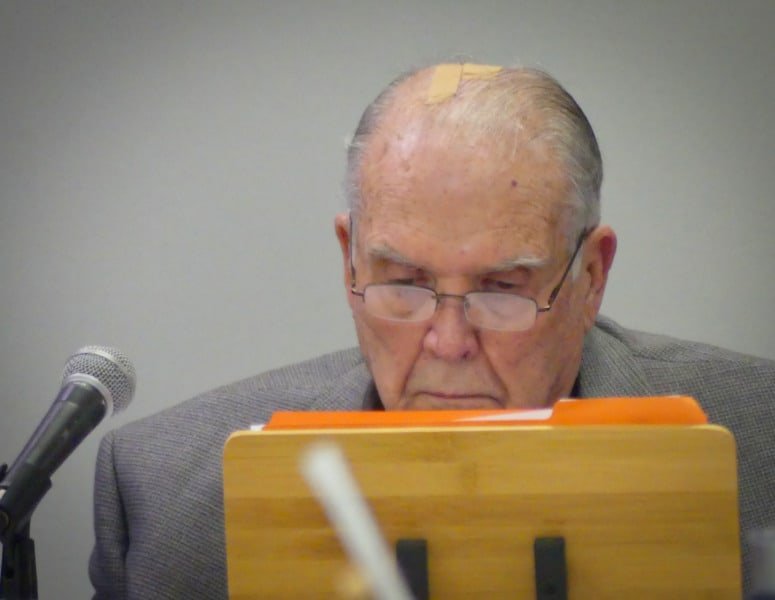
“Help us to remember your high callings as the agents of forgiveness and reconciliation, love and peace, healing and hope and the Village made dark by fear and hatred and brokenness.
“Today, dear LORD, guide our hearts and our minds in the spirit of fairness, right thought and speech. and part of your supreme wisdom on our activities so that our affairs may reach a successful conclusion.”
“We ask you to bless and protect those who are in harm’s way protecting our country. For all that live in our Village, our friends, our relatives that are having to face serious illness, especially one of our Directors, Mr. Mike Medica.
“LORD of loving kindness, we ask you to listen favorably to our prayers and strengthen our faith in you.”
“In CHRIST’s name we pray. Amen.”
Pledge of Allegiance
Erickson: “Before I call for a motion to accept new business today, I would like to make a few remarks. Last week the deterioration of our community discourse reached a new low. Meeting decorum was lost. Harsh and condemning words were loudly voiced and personal threats were made. And all of this contact (sic) conduct was shared broadly on social media. Are we not better than this?”
“Of course, we are because we have no other choice if this Village is to be effectively promoted to a waiting world.”
“Instability and pervasive negativity among residents, widely shared through print and social media, will do more to damage our attractiveness in a competitive world than any amount of marketing funds or talent can overcome.”
“We must become better, starting now.”
“Today will conclude our May 15th regular Board meeting. It will remain an open meeting as will future meetings, as long as our rules of decorum are followed.”
“In these assemblies, we will put the safety of our Board, our staff and our guests, first.”
“To that end, some of our Property Owners have been temporarily banned from Board meetings and other forums. And I will not hesitate to once again suspend this or any other meeting and have the premises cleared should decorum not be upheld.”
“Also, of high priority is restoring and protecting the image of the Village. The Board and the staff need your help with this. It’s really quite simple. Before you publicly express your opinion about Hot Springs Village, whether verbally or in written form, consider how a potential Property Owner or a current Property Owner, deciding whether to remain so, will react to your message, because they are watching. We know this, because we are hearing from them.”
“That’s all marketing is, really, promoting an image that you want a positive reaction to. So you, fellow Property Owners, are the best or worst marketers that Hot Springs Village could ever have. Let’s use our power wisely.”
“Our Parliamentarian, Director Luehring, is serving this Board well in her role as our advisor. Over the past couple of weeks, she compiled responses to all Parliamentary issues that have been expressed to us, of late.”
“Two days ago, she emailed that response to those who have been most critical on this topic. I would ask that this same document be made publicly available on the Hot Springs Village POA website for all to see.”
“All remaining concerns are best addressed to the CEO or to the Board by the many methods made available to do so. All comments are heard, but not all will be agreed with by those sitting at this table. Should that become problematic for you, then you are encouraged to join with those who can influence outcomes either by joining a committee or running for the Board.”
“What happened last week will not be allowed to happen again, so that this Board can get about the important business of advancing this Association for the benefit of all of us.”
“At this point, may I have a motion to adopt the order of business?”
Dixon: “You may”.
Erickson: “And a second?”
Indecipherable
Erickson, “All those in favor, say ‘aye’.”
Board: “aye”.
Erickson: “Any opposed?”
“Okay, the motion stands.”
“May I now have a motion to accept in the consent agenda a motion to receive the May 15th CEO Corporate Secretary’s report, the May 15th CFO Corporate Treasurer’s report and the May 15th COO report? May I have such a motion?”
Board responded and seconded
Erickson: “All those in favor say yes.”
Board responded in favor
Erickson: “Opposed?”
“Okay, as we have no current business, we will be attending to two items of new business. The first of which is the Board’s strategic focus areas following the retreat.”
“I am going to read excerpts of a document that has been on the website in the board packet for over a week now. I will just read excerpts from it and then we will open it up to discussion among the Board members.”
“The newly seated Hot Springs Village POA Board held a two-day retreat on Wednesday, May 1st and Thursday, May 2nd in accordance with POA policies, Chapter 8, Article 4, Section 2, Item 14, referencing the duties of a Board member. The purpose of the 2019 retreat was threefold.”
“First, to develop a proposed directive which specifies measurable outcomes and decision points to be evaluated against the Association’s purpose, beginning in the year 2020.”
“Second, for the Board to speak this directive with one voice to the CEO by ratifying it in the May 2019 Board meeting in prep for the upcoming 2020 budget season.”
“And third, for Property Owners to gain confidence in the process of the entire Board and community, collaborating on those outcomes and decision points.”
“The following areas of strategic focus are recommended and supported by a majority of the Directors at this table. They should inform operational and governmental decision making for the remainder of 2019 as well as the 2020 budget. From an operational perspective, these are the areas of strategic focus:”
“The first is the Protective Covenants, making them more easily understandable by residents and by realtors.”
“Second, to find a developer to build, maintain and run lodging in the Village.”
“Third, to improve the financial return on existing POA assets.”
“Fourth, broadband – expanding broadband.”
“Fifth – addressing healthcare.”
“Sixth – rooftops that are smaller in nature, for current and future members.”
“And the seventh and final in the operational category is called ‘managed subsidization’ to reflect the value of each amenity, that accrues to all Property Owners.”
“In the area of governance, which you will be hearing about a little bit more in the agenda, is the formation of a Finance Committee.”
“And finally, as hybrid, meaning some governance, some operational – establishing Board Brainstorming Sessions. You’ve heard of them as BBS. Board Brainstorming Sessions, which will incorporate staff updates and agenda setting discussions into its format.”
“Second, build and gain Property Owner trust and support outreach.”
“Third, committee establishment and revision, notably ‘marketing and governance.”
“And fourth and final, is CMP Advisory Committee, giving it a chance to succeed.”
“It is recognized the 2019 goals have been established and efforts are currently underway to address several of these areas of strategic focus. Continued progress is encouraged and expected in these areas.”
“First is the lodge. By August and in collaboration with the Hot Springs Village Chamber of Commerce, the CEO will present a path forward to the Board for lodging. That’s by August, this year.”
“Second, broadband and healthcare. The Board requests that the Government (sic) Affairs Committee present updates on these and other external issues every August, November, February and May. Additionally, by December, the CEO will offer improved wifi in the Coronado Center and Ponce and Woodlands complex.”
“Third, smaller rooftops – again, these are already goals that are in place. They were put in place by the previous Board with concurrence of the CEO. Smaller rooftops – by June the CEO will present first pocket neighborhood proforma and sales launch plan to the Board.”
“Finance Committee – a draft of a charter is on the fast track and it’s being evaluated for impact to other governing documents so that it can be presented for consideration in time for the 2020 budget season.”
“Next, Board Brainstorming Sessions – these nondeliberative discussions are scheduled to take place eight days before each month’s Board meeting.”
“Property Owner trust and support – ‘Let’s Talk’, ‘Forward Together’ and other similar forums and ideas should be continued and encouraged.”
“The Governance Committee – its charter was reviewed, this says yesterday, but actually the date was May 14th, was reviewed yesterday for improvement opportunities.”
“Marketing – the CEO is charged with pursuing consensus with the CMP Advisory Committee, staff and Board of Directors on a marketing strategy by August. The CMP Advisory Committee is pursuing the establishment of a marketing subcommittee as a top priority. An alternative option to have a marketing committee accountable directly to the Board does not currently enjoy majority support, although it was discussed at length at the retreat.”
“Probably the most highly regarded item to come out of the retreat was to establish regular discussions by the Board. In the executive session on Wednesday of the retreat, it was obvious that all Directors were engaged in open discussion and clearly recognized some compatible ideas that were thought to be problematic, prior to the retreat.”
“So with that I will open up this topic to be attended for open discussion among the Board members.”
“Director Garrison”
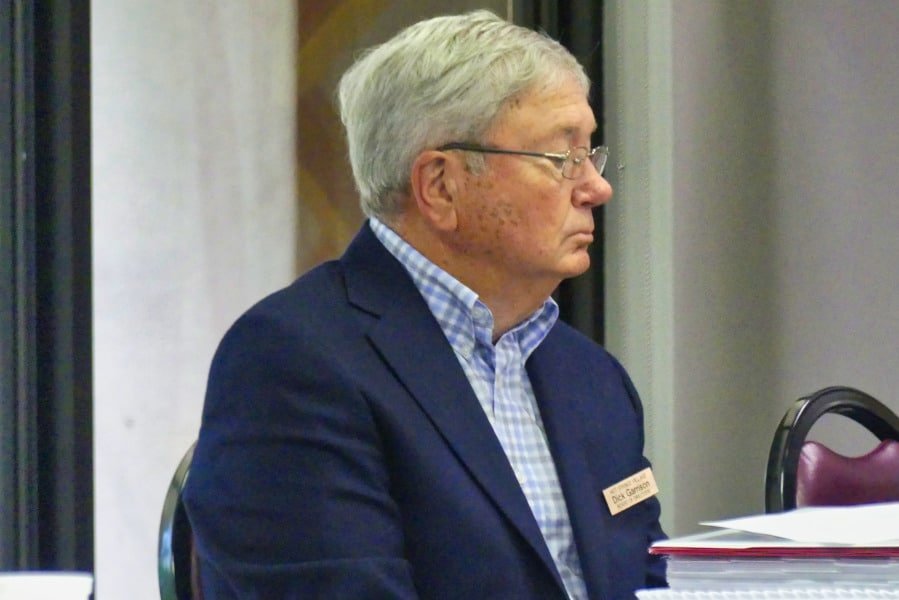
Garrison: “I’ll go back to my same old (indecipherable) and it’s marketing. Under our SWOT analysis, the number one opportunity we have in this Village, is marketing. Under our weaknesses, number three weakness was marketing. And under threats, the number two and three weaknesses were marketing. I’ve been willing to stand aside and let, what probably will be a very good committee, have a subcommittee for marketing. I doubt that they will have a recommendation by August, starting this late. I would think that that would entail a lot of work and it is a concern. I just wanted to (indecipherable)”
Erickson: “Director Dixon”
Dickson: “Chairman, I would like to address Protective Covenants. We had some people ask and make the statement that our Protective Covenants, as they currently stand, are hard to find and read. And one of our Board members came up with the suggestion that we have some Protective Covenants printed and done for Dummies. So, what we have done, all of our permits now, when you go to the POA and pick up the permit, on the back of that permit, it will have the Protective Covenants that by number that will affect that. It will also have the procedure. Stephanie and the ACC Committee, I notice John is here and he might could add to this if we need it, but Stephanie and Jason (Temple) and the ACC Committee are working to repair a document where the Protective Covenants that face Home Owners the most, not commercial, are easy and put in the front so everybody can find them. So that is being done.”
Erickson: “Thank you.”
“Director Luehring”
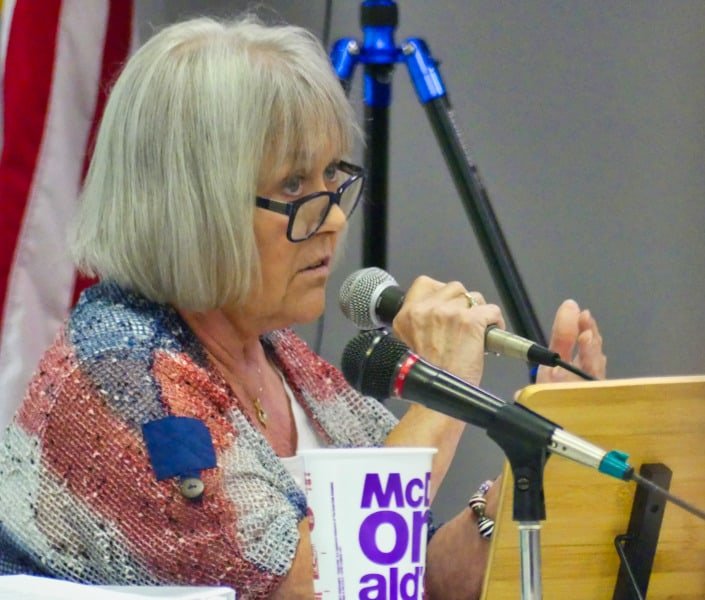
Luehring: “Just a quick comment regarding the Government (sic) Affairs Committee. I think it is wonderful that they are going to come and tell us about what’s happening. There’s a wealth of information there and I think most people are not aware of what they are actually discussing and who they have as visitors. All the information of the surrounding communities is so important to us, right here.”
Erickson: “Director Podawiltz”
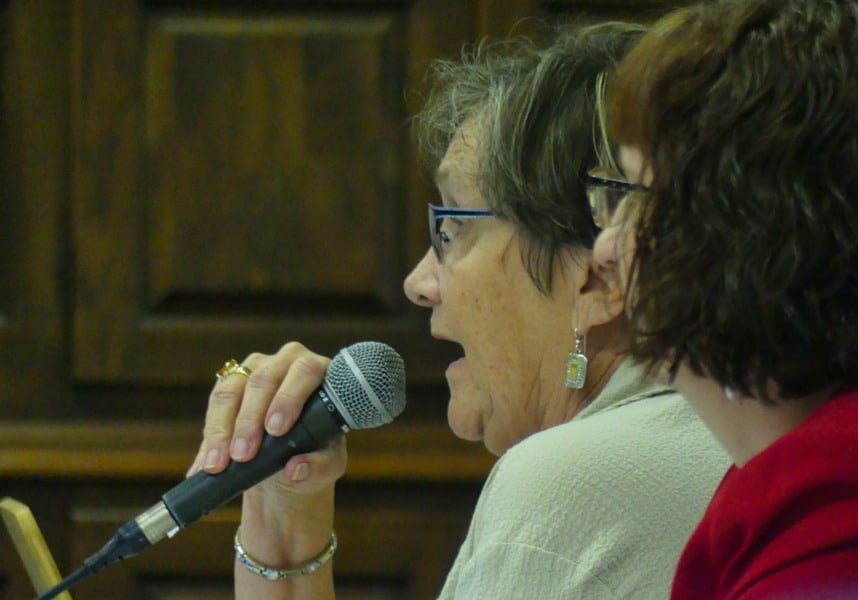
Podawiltz: “I want to reserve my comment in regards to the Finance Committee to the Finance Committee discussion. In regards to the Governance Committee, I was under the impression from our retreat that working on a Governance Committee charter would perhaps be something that the entire Board would be privy to. I made my comment at that retreat that I was concerned about the makeup of the Governance Committee. That I felt the Governance Committee makeup should have a few more Property Owners. So this is my first knowledge of that, upon reading this document, of course, was that the Governance Committee had already reviewed that and I’ve not see anything as a Board member, as to what your findings have been and that is of some concern to me.”
Erickson: “Okay, well I can address that as chair of the Governance Committee. We had our first discussion about it on May 14. And we drafted up some ideas. Scratched them out on paper. In our meeting on May 28th, we’ll finalize our recommendations. And they won’t be effective until the Board says they are effective. That will be the next stop. After we make our recommendation.”
Podawiltz: “I just like to be able to have a little more input. The way the Governance Committee Charter is written is that we, as non-Governance Committee members, may attend that meeting and at the end of the meeting, we may speak IF we are called upon. That’s just to me, a risky way of saying, ‘I have a chance of being involved. Thank you.”
Erickson: “Thank you. Anybody else have any comments on the retreat?”
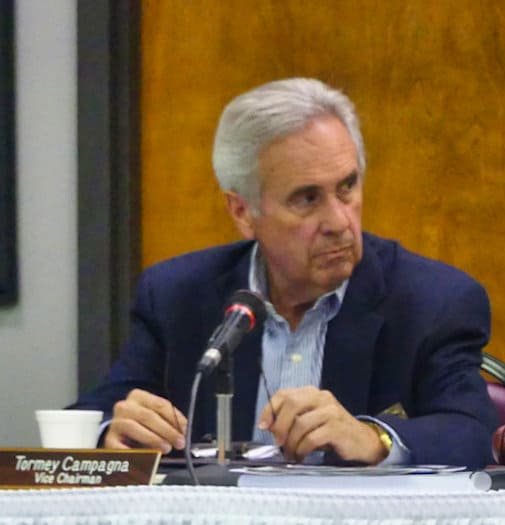
Campagna: “I’d like to add a little bit to what Dick said regarding the marketing. It is clear to all of us, I think, that we could do a better job of marketing. And that in turn would cause our revenue to increase (indecipherable) because we’d sell more lots, have more houses and so forth. So, it’s a little disappointing to me that we put marketing lower down on the totem pole than I would like to see it. And I am sure several others felt the same way. Like Dick, I will stand back and go with that and see how the CMP Committee does. But because of the importance of it, I still personally believe, based on how that works, we still need a Board-level marketing committee if we want to move the Village forward faster.”
Erickson: “Okay, well, I’ll just close by saying…Director Garrison.”
Garrison: “Just another comment. I hope you do this every year. I got a lot out of it. I think the other two newbies got a lot out of it. I think it was a good head start for us. I hope I never hear the word, ‘parliamentary’ again, but…”
Erickson: “I think you are going to be disappointed.”
Garrison: “I think it was a good move for the Village and for the Board members.”
Erickson: “Thank you”
“Director Campagna”
Campagna: “I would like to also say I think the retreat was highly (indecipherable) It gave us all an opportunity which I am not sure was done in the past to have open, honest conversations, which surely we didn’t’ always agree. There were contentious points at times, but that’s the way we get something accomplished is by open conversations between us and between you all out there. Thank you.”
Erickson: Thank you.”
“Diane”
Podawiltz: “I just want to add that one of the (indecipherable) valuable things was because of how we were able to banty back and forth with one another, etc., that that evolved into our Brainstorming Sessions and the fact that we took three meetings and combined them into one and that having a brainstorming. And that we all feel, I think I can speak for everybody here, that we will be able to evolve the Brainstorming into the ‘Let’s Talk’ and more forums and that we truly can have open communication and that if people are concerned about something, we truly will talk about it.”
Erickson: “Okay, very good. Thank you.”
“Director Luehring”
Luehring: “It’s a hype right now to encourage people to come to ‘Let’s Talk’ on Saturday at 9 o’clock at DeSoto Club. There’s still room. We’re only at 29 people. Come on over.”
Erickson: “Thank you. Anyone else, then? Okay, then I’d just like to conclude that I too thought the retreat was tremendously valuable. Particularly, there is no substitute for face-to-face discussion among Board members. Particularly, when many of us didn’t even know who each other of us was until they were on the campaign trail. So it is a great opportunity to get to know one another and where they are coming from. And that, it’s very, very valuable. It also, I think it’s greatest value, however, included the opportunity for the Board to speak with one voice to the CEO on matters that the Board feels is of highest importance to the Association. And I know there’s been some commentary about that. Is that happening, as it should? So, I hope the community finds that this is a positive step in that direction and more to come. So, thank you all.”
“Okay, the next and final item on the agenda is a discussion around the proposed Finance Committee Charter. Before I turn the microphone over to Liz Mathis, as our CFO and Treasurer, I’d like to start first with a Board discussion about the purpose for such a committee. What each of you feel is the reason why six out of seven of us felt that having such a committee would be a high priority for the Association. So, let’s just talk about that for a moment and then I will turn it to Liz to talk about the charter, itself.”
“Director Luehring”
Luehring: Thank you. That’s my main concern, is the purpose of the Finance Committee. I know that there’s several renditions of the Finance Committee that have been tossed around and that people seem to want. I am conflicted with that myself. I don’t’ know. I know I think what the community might want and I think they are not going to get that closeness to a Finance Committee that they might want, what we’re discussing today. I know what I think the staff might want and that seems very reasonable, also. I am not 100% sure what the Board wants. I am a little conflicted in the fact that I think it will run too much into operations for the Board to be as involved as I think people might want it to be. So, thank you and if everyone else can tell me what the purpose of this is, I will be enlightened immediately.”
Erickson: “Okay, very good. Who would like to speak to that first?”
“Director Campagna”
Campagna: “I don’t think any of us that thought we should have a Finance Committee thought it would be taking over the operations responsibility of the CEO. But I believe, at least three or four of us felt that a Finance Committee could look at the financial situation we are in at any given point in time, make recommendations, not demands, as to what could possibly change to improve that position and at the same time as we move into a budgeting season, they could help us figure out the best way and the most appropriate things to budget for in next year’s budget. Which, in my mind, and I think it is the case, the Board approves the budget and that means they should be responsible for making sure that the budget put in place meets the objectives, not only of the POA but of the Board’s goals and that’s how I view to what a Finance Committee will do, has a primary function of. Again, not manage operations.”
Erickson: “Let’s let everybody have an opportunity to speak to the question and then I will circle back. Anybody else? Buddy?”
Garrison: “We had a committee years ago called RASP. And RASP, I thought, provided a very good function for the Village. It took a deep dive into some critical financial matters. I think with some (indecipherable), I would hope that the Finance Committee could do that and take some of the chore of doing those kind of things off of staff and make some recommendations to staff.”
“Second thing, I would hope the Finance Committee would do would be to help change our planning process and our reporting process. I have been very critical of our planning and reporting process and I would hope that the Finance Committee could be an aid here and help in planning and reporting the financials for this Village.”
Erickson: “Very good. Thank you.”
“Chairman Podawiltz..Director Podawiltz”
Banter and laughter
Podawiltz: “I looked upon the Finance Committee as an aid to our staff. I also looked upon the Finance Committee as a bridge to our various other committees – our Lakes Committee, our Golf Committee, our Recreation Committee, our Public Works Committee – helping, not only in the budgeting process but sometimes in doing some of those Return on Investment type of analysis, types of things, that can be time consuming or you can knock them out pretty quick, depending upon how big the capital project is that you are looking at. I really look at them as being something that our staff, primarily our CFO, more so than whoever is assigned to be the Corporate Treasurer. But, thinking more in lines of the community and how the community operates as being the CFO and the Chair of this committee, being able to do what they felt they needed to do, in order to properly, for the Board to properly uphold their fiduciary responsibilities. I didn’t want to tie their hands. I didn’t want to handcuff them in any way, shape or form. And I did not want how the CFO interacted with this committee to, in any way, that would be a separate item to the performance of her ‘job’ so to speak. Not that it will affect her employee evaluation or anything in that manner. So, that’s why I didn’t establish a bunch of guard rails that you have to jump through this hoop and to do this dance. Because it was, what do we need as a Board to fulfill our fiduciary responsibilities and how can this committee aid us in that?”
Erickson: “Very good. Thank you, Director Podawiltz.
“Director Dixon”
Dixon: “Chairman, the charter outlines this. If you look at the purpose, it says to provide strategic counsel to the Chief Financial Officer, Board of Directors that promotes a financially healthy organization, serving as a liaison between the community, other committees, and the Association. To flip over to duties and responsibilities, look at number C. There are six things under there but the first one says, ‘evaluate plans, programs, make recommendations to the Chief Financial Officer, as appropriate in the following areas. And look at those other five that are after that. I think that says what they need to do.”
Erickson: “Very good. Very good. So, at this point, and Director Luehring, you want to make the wrap up.”
Luehring: “I just want to say, I didn’t indicate that the Board would take over operations. It is just they might get too involved in operations by having such oversight.”
Erickson: “Anybody else want to speak to their viewpoint on ‘purpose’? If not, then I’d like to turn this over to Liz. And Liz, can you walk us through, please, what you are proposing?”
Mathis: “Thank you, Madam Chair. I am not going to read the memo that I put in front of you, but it did kind of compare some of my thoughts on this process and how we got where we are and some of what I view the purpose to be.”
“Over the past several months, particularly during the Board election cycle, it became very clear to me that our community had a desire for a finance committee. Personally, I have been frustrated by the gap in communications or communication channels with the community about our finances. In my three years with the POA, only a handful of people have ever contacted me with questions, but when we were able to sit down, discuss and share conversation, really good communications and oftentimes had great insight with gains by both myself and the Property Owner.”
“I believe that creating a finance committee will be a valuable resource for both the staff and the Board. I began doing research on finance committee structures in April. I researched both nonprofit and government sectors as well as other private communities, including. several Cooper Communities.”
“When the Board identified the finance committee as a priority during the May 2nd board retreat, we shared a draft charter with the Board that we had created compiling a lot of that research.”
“Several Board members offered feedback on that draft and even a separate charter that was compared to the draft charter. Some Property Owners also emailed me their thoughts about the committee. All of that feedback was considered, and a number of changes were made as a result of that feedback.”
“To me, the overall goal of a finance committee should be to help support the fiscal sustainability of an organization. The charter should ensure compliance with bylaws and other governing documents as well as clearly defining the roles and responsibility of the committee, the board, the treasurer, the CEO and the CFO.”
“I currently serve in two different roles. I am the CFO, which is the staff role, with a very clear job description. I also currently serve as your Board Treasurer, which has it’s own responsibilities as detailed in the bylaws.”
“The Board itself, of course, has to maintain it’s role as fiduciary and has delegated certain responsibilities to the CEO through both the bylaws and policies.”
“So in compiling all of those areas, we try to include that in the proposed charter to make sure that we address each of those areas. A few of the goals from this charter come directly from some of the resources from our research that include comments like, ‘the treasurer and finance committee roles play a truly strategic part in oversight, planning and governance. Have a clear understanding of the treasurer’s finance committee job descriptions. A part of the treasurer’s role is to make sure the board receives accurate financial information in a timely manner and as a board chair given ample time and attention to (indecipherable) financial issues.”
“The committee should use a financial lens to consider the organization’s plans and challenges. The best finance committees help staff and the board think through financial questions and develop options.”
“Most of the research we looked at discussed finance committees as Board committees, made up of only Board members. With a smaller Board and from the community dialog that we have, a joint committee substructure seemed to be a better fit for Hot Springs Village.”
“This structure allows the Property Owners to serve on the committee, work in partnership with and support to staff and have a direct connection to the Board through your Treasurer. We believe this charter which has been reviewed by the Governance Committee meets all of those needs and this charter is now publicly submitted to the Board for consideration and additional comment. Staff are recommending adoption of the final charter by the June Board meeting so the committee can be a source of support through our 2020 budget preparation.”
Erickson: “Very good. Who would like to comment then to the charter, itself? And thank you, Liz and Lesley for putting this together and presenting it to us today.”
Podawiltz: “I would.”
Erickson: “Director Podawiltz”
Podawiltz: “I would like to point out that as you have this before you, that under organization and appointment, item three on this charter, item D of that says that ‘The Association’s Treasurer shall serve as the Chairperson.’“
“According to our bylaws, Article 12, Section 3, ‘each committee shall consist of a chair plus two or more members and a member of the Board of Directors shall be appointed by Board Chair. The CEO will determine the appropriate staff member to be set as liaison.’ All committee members must be members in good standing. We will not necessarily know that an Association’s chair, the Treasurer, will always be a Property Owner.”
“The Chair, in Item C, ‘The Chair, Vice Chair and Secretary shall be chosen annually by a majority vote of the new committee.’ So if the Chair is to be chosen by the committee, how can we be in violation of that and say that the Chair shall be the Association’s Treasurer?”
Erickson: “Okay, that’s a good question and as Chair of the Governance Committee, that is a topic that we are actively looking at. That’s Article 12 of the bylaws and we are aware. It was brought to our attention, probably in March, I think of this year that our bylaws are in conflict with some of our committee charters and so as a Governance Committee, we’re looking to make recommended proposed changes to Article 12 in the committee section. So, that those conflicts don’t exist. And we’ll be bringing those to the Board, after our May 28th meeting and that will resolve this conflict.”
Podawiltz: “So you’re saying to me that, Madam Chair, I want to make sure I understand…you’re saying to me that you would recommend going with the charter that is currently in violation of our bylaws because we are going to go around. We’re going to go after the fact and we’re going to change bylaws.”
Erickson: “That would be a consideration. Certainly. But the Board members would have to understand the path for the changes in the bylaws that we would be pursuing, when they are considering their approval of the charter.”
Campagna: “Madam Chair”
Erickson: “Director…Vice Chair Campagna, I was corrected earlier.”
Campagna: “For the bylaws, not to be in conflict with this charter would mean we would have to change the bylaws, such as the Chair, and start appointing Chairmen to committees. Right?”
Erickson: “Not the chair of the committees. What we said is, what we’re going to recommend is unless the charter speaks to it otherwise. So that each charter has some flexibility to address it, as that charter and as that committee chooses.”
Campagna: “I think I’ve got it tied up here. Today it says that the chair’s position will be voted on by a committee. Plus it’s (indecipherable). Today we do have some committees with chair’s positions that are voted on by committee, by you.”
Erickson: “By the chair, yes.”
Campagna: “I’m not too excited about changing the bylaws to support this particular charter. It puts more power in less people. I like the fact the Board makes decisions, not the self, not the lone person, but by collective now.”
“In effect, if we modify bylaws, we are opening a Pandora’s box to where more and more power gets focused on one individual, potentially, the chair, and not a decision of the Board, itself. But first, I think the policy we’ve had in the past regarding who ends up being the chair of a committee where the actual committee votes on that is a great policy.”
Erickson: “Thank you. I want to be clear too, so that people understand. This is not the only charter that is in conflict in that way. Right? The Audit Committee Charter I believe is in conflict this way. The Governmental Affairs Committee Charter and the Governance Committee Charter. There are several that were meant to be resolved by essentially ceding the decision making to the chartering of the committee rather than defining it, ‘one size fits all’ at the bylaws level.”
Podawiltz: “Excuse me. The problem that I have with that is that we have a hierarchy of our governing documents and the top trump card, the ace of spades, if you will, if you play bridge, is the bylaws. So, you’ve got bylaws. You’ve got policies. And then you have committee charters. And I just would like to say that I have a charter that I wrote, since we’re in the discussion stage. And I care less about any kind of, taking consideration for being (indecipherable). I could care less about it. But I have written a committee charter and it states the purpose as this, ‘to provide strategic counsel to the chief financial officer and to serve as a liaison between community, other advisory committees, the board of directors and the CFO.”
“And the charter that I have written has the duties and responsibilities that, ‘to work in coordination with the CFO’. So CFO has the biggest hammer and they are outlined. I am going to pass these out for everybody, because since we are in a discussion point, I would like for this charter to be considered as a possible charter for a finance committee. Which I understand we will be voting on at the June meeting.”
Erickson: “Anybody else want to speak to the charter, itself?”
“CEO Nalley would like to speak.”
Nalley: “I just wanted to point out one thing and remind the Board that regardless, the Board has the authority to approve all charters. So if, obviously, and I think it is obvious, but if, if there was a conflict like this.” Maybe just think through whether or not there should be changes to the charter. Ultimately, that is your call, anyway. So.”
Erickson: “Changes to which charter? The proposed charter?”
Nalley: “Any of the charters. If a concern is, for instance, what Tormey said that power might be in one hand. Might really, actually, power belongs to the Board as far as what the charters say. So, if there is anything, whether it is to your point, bylaw or charter issue, I mean really the Board should look at those in tandem.”
Podawiltz: “Just one other thing I would like to say about this proposed charter, that I wrote. I did give it to the Governance Committee. Granted, they didn’t get it in a real timely fashion and for that, I apologize. But I asked where it could possibly be in violation of any bylaws or policies. And I did not receive a response on. So I would assume then that it’s not in violation of policies or bylaws. Thank you.”
Erickson: “Vice Chair Campagna. That’s just a mouthful. V. C. Campy”
Campagna: “I had an uncle that changed his last name to Camp, because it was an easier (indecipherable).
Erickson: “(indecipherable)
Nalley: (Indecipherable) “…do it”
Campagna: “Lesley, in response to what you said, what can happen will happen. Once we approve a charter, like this, that means that the chair can start saying, ‘Okay, I want to have (indecipherable). Liz, Diana or me could be the chairman of the committee. I don’t like that idea very much. I don’t think that we should be in that position. Because we have some charters now that actually conflict with our bylaws doesn’t mean we should change our bylaws just so the charters don’t conflict. We should modify our charters to follow the bylaws, whatever ones happen to be in place at the time. So, I can’t go along with this.”
Erickson: “CEO Nalley”
Nalley: “That is the actual point I was making. Regardless of which change, whatever the wishes of the Board are, they should match. (Indecipherable)
Erickson: “Any other comment on the proposed charter?”
Podawiltz: “Is that singular or plural?”
Erickson: “We have one proposal in front of us. This one was offered up and taken into consideration when the proposal was made. However, it is appropriate for these Board members to consider this charter as it differs from the proposed charter, as they contemplate whether they want to approve this charter or not. Or suggest changes to it. So if you could make a specific change recommendation, that would be appropriate.”
Podawiltz: “Well, I specifically would change how the chairperson is determined for the charter. And I would specifically change for the duties and responsibilities to… I don’t know how many people we are going to get that want a job with the duties and responsibilities here. As I said, the charter that I had submitted leaves it wide open for the CFO to do whatever he or she thinks would be necessary to do. And this is so job specific that I think it tangles people up and is too constrictive.”
Erickson: “Treasurer Liz, I know you took into consideration this second charter when you made your recommendations here. Can you speak to the couple of things that Director Podawiltz is commenting to?”
Mathis: “I certainly understand where she is coming from. There is a lot in there. For me personally, I felt like it was really important to clarify what the role of the committee was. And if you leave it too wide open, then the committee doesn’t know what they should be looking at or we end up going down rabbit trails we really don’t need to be as a committee. And depending on how the committee chair piece is structured, that could create some challenges in, just in making sure the committee stays functional and operational and long-term it’s successful. And that they have strategic areas of focus.”
“I know at one point we changed some of the wording in that ‘duties and responsibilities’ to remove some of the language specifically referring to the CFO because we felt like from the purpose that it was implied. That it was in coordination with and in conjunction with the needs of the staff.”
Erickson: “Thank you.”
“Does anyone else have any comments about the charter that has been placed before us and the comments that result from this charter that Diana is proposing. Not proposing, necessarily, offering for our consideration as we examine the proposed charter?”
“Director Luehring”
Luehring: “This has nothing to do with any of that. This is something…this is under limitations on the original charter that we looked at. Liz’s charter. In item F, ‘the committee shall maintain confidentiality of all proprietary information of the Hot Springs Village POA or furnish to the HSV POA’. Will these committee members be required to take an oath? And will they also be required to take the oath for financial, for fiduciary responsibilities and duties?”
Erickson: “Because you are concerned about confidentiality?”
Luehring: “Yeah”
Erickson: “Do you have a thought on that, Liz? That is a decent question.”
Mathis: “My thought was not necessarily that we would be getting into issues that would necessarily lead us down the path of executive session, that the Board would address. But more that, maybe if we were giving a contract or looking at a plan that there would be some confidentiality in that until the opportunity, that the Board had an opportunity to review it and take it public.”
“So not necessarily in the matter of legal things or things that are confidential in relation to our policies or anything like that, but more of in planning stages of things and not doing that. Even now, if a Property Owner wants to come in and review a certain contract, that’s got a confidentiality clause in it, there, has to sign a statement saying that the information they viewed, that they will maintain confidentiality on that information. So I think it’s more on the lines of that.”
Luehring: “Like a nondisclosure.”
Erickson: “Would that be satisfactory? If nondisclosures were signed by committee members when they were presented content that needed to be kept in confidence?”
Luehring: “I think that it certainly should be necessary.”
Podawiltz: “I would think that anyone serving on a finance committee should sign a nondisclosure, just in case you run into it. But there again, I would like to point out that I have followed the same guidelines in the alternative charter that is before you, also.”
Erickson: “What other comments do we have on the Finance Committee Charter?”
Luehring: “Never mind”
Podawiltz: “Could I ask Liz a question?”
Erickson: “There is no later. This is the last agenda item. You know that, right?” (This was in response to Luehring.)
Podawiltz: “Liz, why did you change from your original charter, I did speak out in being in favor of? In that one, you did not have the Association’s chief financial officer as the chair. In that one, you stated that a chairperson should be elected by a majority of the committee members.”
Mathis: “I believe that actually came out of feedback from other Board members, that was provided to better delineate the role between the CFO and the treasurer. In best practice, in most finance committees is that your treasurer is the chairperson.”
“It was just in further researching and looking at all of the different pieces and comments and even actually some Property Owners’ comments that came back to even further reiterate the different roles and to make sure that it. That the Board wasn’t digging too far into operations and that you were allowing the treasurer to be that point of contact with the Board.”
Podawiltz: “Well, we were allowing the committee members to pick their chair and the committee members to do that. As a Board member, I think it would have been helpful if those comments that you have been receiving back would have been shared with the Board members.”
Erickson: “Director Campagna”
Campagna: “I think this is complicated because one person occupies both positions. If that was not the case, this language wouldn’t need to be in there at all. You could go with what’s common practice in most corporations. For example, the treasurer be chairman of the finance committee, whether a for profit or non profit organizations. So, I am not suggesting our structure of who’s treasurer should change. But that’s what’s making this thing more complicated than it needs to be.”
“Maybe we need to look at that language and figure out, that would go, there is…let’s assume we move to where the committee elected their own chair. For all I know, that could mean they decide that you as a liaison, so to speak, could be the chair, because you are on the committee. Right? No?”
Indecipherable speaker
Campagna: “If she was a committee member, she could then be elected as chair. Okay, and first they wouldn’t have heartburn with the CFO being a committee member of that committee would make sense to me. And if the committee chose to elect that person as to be the chair, well, so be it then. That is their decision.”
Podawiltz: “So then we go in and revise if our CFO is no longer a Property Owner?”
Campagna: “Well, there might have to be a condition for that. For sure they need to be a Property Owner.”
Luehring: “May I make a comment?”
Erickson: “Yes, Director Luehring.”
Luehring: “I believe we’ve veered from precedent, as far as Property Owners, already, with the CMP Advisory Committee. By having Jody Latham on it. I don’t believe that she owns property. She is representing a Property Owner.”
Podawiltz: “Ma’am, I believe that she has been a property owner for a long time”.
Luehring: “Is she a property owner?”
Podawiltz: ”That’s what was said at the Board meeting when people were identified as the committee members.”
Luehring: “I stand corrected. Thank you.”
Erickson: “I do and I’ll just make a point of fact, in that the bylaws, it requires that all of our standing committee members be Property Owners in good standing. That’s a requirement at the bylaws level.”
“Yes, CEO Nalley”
Nalley: “I don’t want to make this about an individual, but the Property Owner was actually the Corporation. We researched this. Corporations have the authority to allow someone that they appoint to act in their behalf. So we do have situations where someone, they personally are not a property owner, but their corporation. Say they are a president of a corporation; they may elect for themselves to…that’s probably how we get into some of those discussions. Outside of that, I didn’t think that would be a (indecipherable ) committee before we had both as an ad hoc committee. We had both employees and Property Owners on that. So, over time we have, we have definitely, maybe not, drawn a line in the sand as to what our bylaws say in terms of committees.”
“Each committee based on its purpose has been chartered the way that it was needed to be chartered. I am not saying that is the right thing to do. It certainly, those weren’t all decisions made at this table or even by anyone sitting here. Some of those were made before that. But the facts remain that there are several charters, several practices that maybe don’t line up. The real question is, ‘what does this Board want out of a finance committee? And let’s make that happen. How do we make that happen?’”
Erickson: “Okay, very good.”
“Director Podawiltz”
Podawiltz: “I truly want a finance committee. I’ve made that very, very clear on a number of occasions. I can’t go along, just because past Boards made mistakes and didn’t follow the rules and let things slide or whatever. I, in good conscience, cannot ever accept my position as a Board member that I would agree to something that doesn’t follow our bylaws and policies that are in place at the time of accepting it.”
Erickson: “Thank you”
“CEO Nalley”
Nalley: “I just want to ask one question and this is on Diana’s, Diana’s version. It says in here there’s a report that’s due. Let me find it again. The committee is responsible for submitting an annual report of committee activities. I was thinking, Diana, that you have another section in here that talked about. What I can’t figure out is, what work product you would be expecting the committee to give and to whom they would be giving it. That was the only question I have on that.”
Podawiltz: “Well, it is my understanding that our committees are supposed to give annual reports, outlining the work that the committee had done during the year. That’s what I was referring to, the committee activities and accomplishments – the types of things that they worked on and what came out of it.”
Nalley: “What about through the year?
Podawiltz: “Well through the year they would be reporting to us as they worked on projects, as the CFO assigned them to work on something.”
Nalley: “Reporting to the board…?”
Podawiltz: “They’d be reporting through the CFO. They’d be going through the CFO.”
Erickson: “Alright, Treasurer Liz?”
Mathis: “I just, kind of following up on the question that you asked me earlier on why the language changed and where we are going. I think that what the feedback was, the original charter that we first drafted was more of a staff committee, which is in line with the charter I believe from what I’ve looked at, that you got here. And there was a request to try to bring it and connect it with the Board a little better, other than through the staff channel. And so I think that is what we were trying to address in bringing that treasurer role into it as that touchpoint with the Board, directly with the finance committee through the treasurer. So that’s what we were trying to address, which is how that language was changed.”
Erickson: “Thank you”
Podawiltz: “Well, I have everything going through the CFO. So it is still coming through the CFO. I don’t know what else I can say about this.”
Erickson: “Okay, thank you.”
“Director Dixon, do you have anything to add?”
(He didn’t have anything to add.)
Erickson: “Liz, do you feel like you have feedback from this Board, that that will inform any modifications, that you might want to consider for your charter? If not, do you want to ask for any clarifications?”
Mathis: “I think there probably does need to be some clarification whether you want this to be a staff committee or a hybrid committee because that is what changes the structure of the concerns here.”
Erickson: “Okay, very good.”
“Director Luehring”
Luehring: “Thank you chairman. That is what my initial comment was, is the purpose has been warped. It’s kind of warped. From the beginning the very first charter was strictly a staff and I think that is excellent. All the help you can get, you need. I think that’s wonderful. I am all for that.”
“The second was that it would just basically be for the Board’s benefit. I am not sure that that is necessarily needed with the competency of the financial department and what I think of the CEO, also.”
“Third, the comments in the community were that this finance committee is going to help me understand the financials. Now, I am not sure how that could happen. Or how that would happen and you know, maybe someone can enlighten me on how that actually would happen. A liaison to the community is wonderful. Are they going to be able to take them aside and say this is the way the budget is working and these are the financials and really educate them? Really educate them? Is that what their intent is going to be? Again, I am not clear of the purpose of this committee.”
“I’ve seen in the past with committees also, when a committee’s advise or strategic counsel is not taken, things get a little bit tough. I’m not sure that that might not cause just a little bit more division in the Village when people will say, ‘I worked and worked and worked and worked and nobody listened to me.”
“I think that the individual committees, the recreation, the lakes, all of them, right now they are already thinking about (indecipherable). Right now they are working diligently with their committees to prioritize the needs of their particular divisions.”
“That’s community involvement, there. Committee members are from the community. And they are being able to clearly, vocalize their priorities and their desires for the community and what they’ve heard and probably what they personally want also. I am not saying that a finance committee couldn’t help. I would hate to see a finance committee get in the way of that type of communication between the division heads and the committees that they serve on.”
Podawiltz: “That’s a great debate for whether or not you want to vote yea or nay for a finance committee. But that is not indicative to here. This discussion is to which charter or what do you want to have in a charter.”
Erickson: “Well, no, we’re not debating two different charters here in this committee. The proposed charter is the one we are debating to the degree that the alternate charter can inform modifications to this charter. This is what we are discussing today. I want to be clear about that.”
“Yes, everything that needs to be said among us, to get us, to guidance to Liz and a decision among ourselves is fair game.”
“V. C. Campy”
Campagna: “Nancy, you made a comment about this being a staff committee. I won’t support a staff committee. This should be a Board committee. Now maybe it will be a hybrid committee but it’s not going to be a staff committee and get my vote.”
Erickson: “Director Luehring”
Luehring: “Thank you. I think that’s fine that you feel that way. I think that the charter that we were reviewing today is a staff and Board charter. It’s not just staff. I’m just saying that I say specifically, ‘what’s the purpose of this committee and again, it has warped from staff to Board to hybrid and I am not sure where the community still stands in this.”
Campagna: “I think the community wants to feel more comfortable when we produce a budget next year that is in line with reality. The budget last year may have been great or not but it sure didn’t feel that way to a lot of people, the way that it was developed. I think that this committee, if it’s properly formed can go through that it will cause this community to be less divided, not more.”
“I don’t expect this committee to come back and say, ‘hey, the budget that Liz threw out, we’re going to approve is unacceptable to us’. Maybe we will work together and figure out what’s going to work for the Village.”
“That doesn’t mean they are going to give direction to Liz about what the budget has to have in it.”
Erickson: “That’s a careful line but I guess I would remind us that as Board members, it’s our accountability to approve or not approve a budget and it’s our duty of care responsibility to make certain we are as informed as we feel we need to be to make a good decision. It’s about the Board making a good decision, not about, and I just want to set that carefully, a little bit in contrast to, this isn’t a community decision. This is a Board decision. Right? With regard to the budget.”
Podawiltz: “It’s a Board decision, but we need as much help as we can possibly get. And we need to have some help from the volunteers of the community, if they are willing to step up and help with this, to help us make an informed decision. That’s why the need for this committee is there. But we are not debating that today.”
Campagna: “I don’t want it to look like I am suggesting that we are going to get a budget from Liz and Lesley that is inappropriate, necessarily. But on the other hand, I don’t think we have a Board that is full of rocket scientists on finance. I can read a financial statement, but I sure don’t have all the expertise that Diana has or that you may have (looking at Erickson). And other people certainly have more than I have throughout the community and I am sure there are a lot of them that may have less expertise than some of us on the Board.”
“When we vote to make a decision for this community, getting more information, generally speaking, is better, not worse. And having, what I will call in this case, ‘semi-third party’ review that, CANNOT hurt.”
Erickson: “Okay, is there anybody on this Board who could not support the notion of this charter being a hybrid? Part staff advice. Part board advice.”
“Director Dixon”
Dixon: “I have one question, are we going to come out of this…do we have a vote on this today to go forward with it? “
Erickson: “There is no vote today. I am trying to give Liz the information she needs to determine whether she needs changes for what we will vote on. “
Dixon: “Okay, can this be done so we would vote on it in the June meeting? Is that what we are saying?”
Erickson: “That’s what we are driving to, to vote on it in the June meeting, which I believe is June 19th.”
Dixon: “Thank you”
Erickson: “I am just looking for kind of head nodding. Can we agree that this can be a hybrid committee, accountable to both staff and Board? This is a purpose thing, right? I mean I am not trying to vote this charter in. Because it seems like if we answered it one way, this charter would change very, very significantly and I just want to head that off if that wasn’t our intent.”
Luehring: “Okay, I can’t agree that it should be a hybrid. It should be a staff first, Board second.”
Audience saying ‘No”
Podawiltz: “It should be a hybrid and when you have a hybrid you don’t say, ‘first or second’. It’s a hybrid.”
Erickson: “Okay, fair enough. Two different opinions.”
“Yes, CEO Nalley”
Nalley: “One thing I would ask the Board to help me with is as you know there are some governances related to who is responsible for what things. And Liz alluded to this in her remarks. She has certain duties she is responsible for. As you are considering who is going to have what input to whom and how they are going to give it, let’s just make sure that we aren’t, to Nancy’s point, inadvertently circumventing the accountability that will be in play for both Liz and myself. “
“To Nancy’s point, it is very easy for us to say something in committee, and the community to decide that they want pickleball instead of pool and a directive gets issued. That happens very easily in all of our committees and could happen very easily here. So let’s set it up to where we put some guardrails around, it’s very clear, who’s responsible for what pieces and who we’re going to hold accountable.”
“So your point, Tormey, if we deliver a bad budget, you know what you ought to be doing. Alright. There are some levers you can pull for that. If we have missed, if our CFO has missed some significant revenue estimates, we’re not going to hold our committee accountable for that. We’re going to hold…but if she has been ‘pressured’ into changing her estimates in such a way and doesn’t feel like she has, I guess the, doesn’t feel like she has the support from the Board or where she needs the support to stand up and say, ‘I don’t agree with this’. You may very well put her into a situation, not just Liz, the CFO into a situation where they have been forced into that and then are held accountable for that.”
“One of those examples is actually some of our previous committees, where they have changed, they have allowed, I guess, some directives that eventually led to some very bad choices that eventually led to action taken against employees, because of that. I just want to be careful. “
“I personally would love to see it be a hybrid (indecipherable). I think that’s been effective. It’s working. It seems to be working well so far in the CMP Advisory Committee. But it all, it all revolves around how clearly we can draw those lines.”
Erickson: “Very good.”
“I recognize Director Garrison who hasn’t spoken often on this topic, yet.”
Garrison: “In all due respect, to the rest of the Board at this table, I have reviewed literally thousands of business plans, thousands. That was in my career. And I must say, you cannot have too many sets of eyes looking over something as important, and I think, is a business plan.”
“I think there’s flaws in the plans we have now. I’d like to revise them tomorrow. But we can’t. But I think, going into it, if we have another set of eyes, which is a committee, it will only make our planning process better. And that’s from experience because I again, have reviewed thousands of business plans.”
Erickson: “Thank you.”
“To you V.C. Camp.”
(audience laughs)
Campagna: “To your point. If you and Liz put forward a budget that is not a good budget, shame on you. And if we approve it as a Board, shame on us. Because ultimately, it’s the Board that makes the approval. And therefore, it goes just to what Dick was saying. The more eyes that look at this thing and say, ‘heck, this revenue forecast for XYZ doesn’t make any sense. We need to adjust something better.’“
“Because I don’t want to be the guy and I don’t think anyone else on this Board wants to be the person that approves a budget that is never going to work.”
Erickson: “Yes, Treasurer Liz.”
Mathis: “Thank you. Just a comment to that, Tormey. I think you are absolutely right. The key to all of this that makes me work the right way is, though, from a set committee structure, that I have a group of people that will look at things and say, ‘hey, you may want to go doublecheck your numbers on this. This looks a little off’. Because I absolutely want that kind of support and that extra set of eyes to look at it. Because I am in complete agreement with Director Garrison. But that absolutely is valuable. The more people that proofread stuff, recalculate it and make sure somebody didn’t miss a formula or have the right logic going into it and the right strategy behind it absolutely makes everything we do better.”
“But what Lesley’s point is, if we go back and I review the numbers and I hand them to Lesley and Lesley and I present them, she and I are still accountable for those numbers. And if I changed them based on a committee response or if the committee doesn’t agree with my changes, that’s fine. But it’s still my job on the line. But that’s what I presented. Making sure that whatever structure you consider, accounts for both sides of that, is what I would ask.”
Erickson: “And I guess what I would add to this. We’re not just talking budgets, right? We’re talking RFP’s and contracts and everything else that this Board would be asked to consider approving. Right? So, you would always, as our CFO, own that recommendation, through the CEO.”
Mathis: “But it creates a channel for those project plans and those budgets and operating proformas and things like that to go through that set of expert eyes. So that by the time, I’m sitting here or Lesley is sitting there or another staff person who is coming and bringing a plan forward to you guys that it’s had that look and I honestly think that will go a long way to helping our community feel more confident in where we are going with projects.”
Erickson: “Okay, very good. Liz, do you now feel like you have the guidance that you need? Or is there anything else that you’d like to have clarified by the Board.”
Mathis: “I think I understand that you want a hybrid committee; that that’s the general consensus at this point in time. As far as the concern about the bylaws and the wording there, I think we will just have to kind of work through that and maybe the governance committee can help a little bit with that portion of it because that’s a little bit out of my realm and what I am concerned with.”
Erickson: “And we’re actively working on that. Like I said, it was identified in March and then we worked on it, starting May 14th.”
Campagna: “Can I make a suggestion? Diana has some very specific thoughts. Some may be wonderful. Some may be just slightly wonderful.”
(laughter)
Podawiltz: “Some might be bad.”
(laughter)
Campagna: “I suggest that the two of you take some time over the next few days to sit down and go over it and see where more of it can be put in line with both of you could agree to it and (it) might make all the rest of us happy, also. I don’t think we have to go with that charter. I don’t think we necessarily have to go with Diana’s charter. But I think we have to go with one that is great to all of us.”
Erickson: “I would support that say that any Director is welcome to work with Liz on this charter to make it the best possible charter that it can be. That’s, that’s perfectly fine. Very good.”
“Anything else on this topic?”
“Director Luehring”
Luehring: “Thank you. I had a Prius. I could do electric or gas. Just sayin’.”
Erickson: “Anything else on the two agenda items before us today?”
“Entetain a motion to adjourn. Second?”
Seconded
Erickson: “All right. We stand adjourned.” Gavel pounds
Transcribed and formatted by Cheryl Dowden
Photography by Joe Dowden
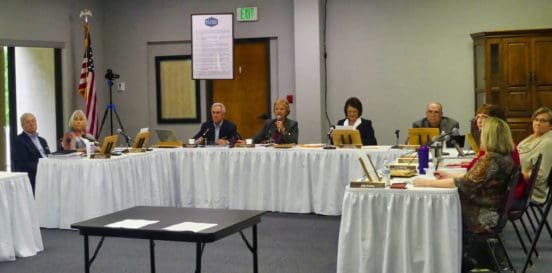










Kirk Denger
06/24/2019 — 12:10 am
Thank you Cheryl for transcribing this meeting the way that all meetings should be transcribed by the POA, word for word in the minutes. You should be nominated for secretary of the BOD to replace the current secretary riddled with conflicts of interest. The Parliamentarian is touted by the Chair as to have answered all questions on Parliamentary procedure and continues to profess that all procedures are legal. Yet can there be a motion to a special meeting? YES. Only if it is relevant to the agenda. If you illegally disallow any and all motions, as was the case at the special meeting 4/17/19, how will you determine if it is or is not relevant.
The CEO stated that the Board has the authority to charter committees regardless of Bylaws.
The HSV POA Bylaws forbid BODs from serving on Standing Committees and specify that the committee chairs shall be elected by the committee members. Podawiltz clearly expressed that she would not break any laws in place any time for any reason.
The Chairwoman stated that the Bylaws were in conflict with the BOD committee charters… Breaking the law is not about “conflicts” or inconsistencies with Bylaws, all of the POA committees are and have been Illegally established premeditatedly by a law breaking Board of Directors, with the exception of Podawiltz, Campagna and Garrison.
The HSV POA BOD, CEO and now CFO have intentionally and criminally broken Bylaws, Federal laws and State Laws of Incorporation. Using their positions of trust hey have colluded with the Congress of New Urbanism through the use of illegal committees chartered to force the Comprehensive master plan on HSV, which is embezzling property, both tangible and intangible from CCI and all HSV Property Owners.
The new business of proposing changes to the Bylaws that they have already broken is obstruction of justice by covering up the crimes they have already committed. The eagerness of the Parliamentarian aqt the 6/19/19 meeting, to motion that the changes to the Bylaws swiftly written up by their team of lawyers should be voted on immediately without even time to read it, proves this.
The POA BODs and CEO are just now being called out for their criminal actions and more will be on the way as the information is forced to be released by the Saline County Court to Property Owners for proper purposes, which includes being subject to a forensic audit that will bring more corruption to light.
Kirk Denger
07/24/2019 — 11:01 pm
Compagna is no longer an exception to the lawbreaking Directors as he is now complicit with obstruction of justice by voting to cover up the criminal lawbreaking BOD, CEO, and CFO.